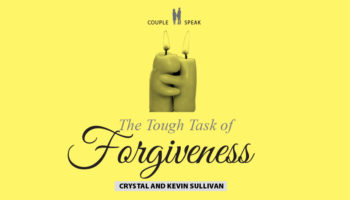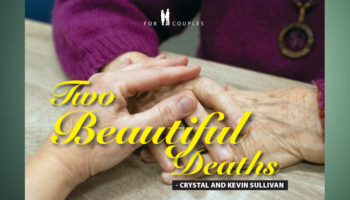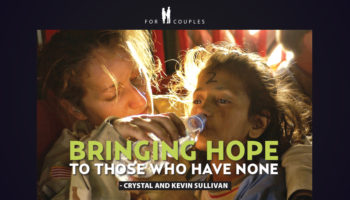Adele Pereira shares the shock and struggle of couples who find they cannot have children, and positive ways of helping them. She helps us look at adoption as good news—for the parents and the child.
“Will you accept children lovingly from the Lord?” He asks. “Yes, I will!” they answer happily together. A few hours later, they excitedly begin unpacking the amazing gift of their sexuality in marriage and begin to make a myriad of life-changing decisions: Will we make love every time one or both of us feels like it? Are we really ready to accept children lovingly today or we want to wait till later? Will we follow the Church’s guidance on natural family planning or the world’s artificial contraception? Left to themselves, the young couple explores all these questions and find their own answers.
Those who do get pregnant will receive congratulations and support from family, friends and church most of the time. But those who don’t get pregnant are left to deal with the pain and shock of dealing with infertility alone. Doctors are cautious to use the dreaded word, “infertility”, goading them on to try the next procedure on their long and expensive list. Family and relatives whisper behind their backs and give hints to visit this doctor or that retreat house. Everyone else seems to be getting pregnant very easily. Attending baptisms becomes something to be dreaded for the anticipated flood of emotions and half-teasing, half-taunting questions.
The Church which prepared them for marriage and children did not prepare them for the possibility of infertility. The church that stood behind them as they took their vows to receive children lovingly seems cold, distant and absent when no children are coming their way.
At the end of our one day marriage preparation course in 1998, I asked only one question: What does the church say about adoption? And I got a very lukewarm response: Yes, there’s no problem with adoption. I had asked this question out of curiosity. I had absolutely no idea that God had planned this for us.
Twelve years and six months into our marriage after walking together through more sickness than health, we welcomed our first baby through adoption. Two years later we welcomed our second.
We were blessed to have two priests in our lives who guided us into discovering God’s plan for us. One helped me accept my barrenness in a counselling session. This was a crucial step—making peace with the reality of barrenness—before we could listen to God’s voice for direction for the future. The other priest directed us to the right adoption agency.
But the Church was largely silent on the issue. For couples struggling with infertility, there was no support from the pulpit on world marriage day, no promoting adoption on pro-life day, no perspective on all the anti-life technologies the doctors were telling us to try.
The real support we got was from praying friends and family who were there to listen to us cry, grieve with us for the loss of my fertility and our dreams, and—most importantly—keep pointing us to God’s will for our lives. In retrospect, I think we were really blessed with the grace to lean heavily on God rather than relying on doctors to get us through this crisis. Psalm 121:1-2 became the prayer of our hearts: I lift up my eyes to the hills. From where will my help come? My help comes from the Lord, who made heaven and earth. God used the crisis that could have destroyed our marriage to strengthen it and our relationship with Him even further.
How to Help Childless Couples
Having walked through this fire, I am compelled to encourage you with deep conviction to love every childless couple you know in the following ways:
- Pray for them: They are going through so much you cannot imagine nor empathise with. Infertility shakes the very core of a person’s identity because we take our sexuality and fertility for granted. It also puts enormous pressure on the marriage, because the couple has to make many important medical and financial decisions while dealing with the grief of losing all possibility of having biological children. In addition, they have to deal with the broken dreams of their parents too.
- IVF destroys life: Be ready to explain how IVF (which is necessary in surrogacy) destroys life and adoption protects life. Medical science is ruthless about destroying life at the prenatal stage. The Church needs to be clear and convincing about the moral implications of destroying God-given life. For that, local churches need to be better informed about which prevalent technologies are pro-life from among the many that are anti-life. More details can be found at http://www.usccb.org/issues-and-action/human-life-and-dignity/reproductive-technology/begotten-not-made-a-catholic-view-of-reproductive-technology.cfm
- Adoption is a loving response: Adoption is a loving, legal response to the evil of IVF and abortion. So, besides warning people against IVF and abortion, it is our responsibility to present them with the loving, life-giving alternative of adoption.
- Don’t wait to be asked: Speak about adoption proactively. Tell them about couples you know who’ve adopted, introduce them to couples who are open about encouraging more adoptions.
- Know the laws: Get familiar with adoption laws and procedures so you have some basic answers to their questions. Since august 2015, all adoptions from India, whether by Indian residents or NRIs, must be routed through CARA (the Central Adoption Resource Authority). All those seeking to adopt must register online at http://cara.nic.in/
- Dissuade illegal adoptions (i.e., not routed through CARA): Some of these are done by people with a side business in child trafficking. Illegal adoptions are extremely dangerous for the child, because there is no professional authority to determine whether the prospective adoptive parents are fit to be parents at all. So, too, without a court order declaring the adoption completely legal, the child will not have any birth certificate or any legal documentation to rightfully inherit from the adoptive parents, if there be any contest from other biological children or greedy relatives.
- Do not be secretive about adoption. Every adoptive family deserves to be completely secure and accepted in the truth of who they are: chosen by God to be a fully legal, loving family. Secrets and lies sabotage marriages, families and communities and deeply hurt the ones who discover them sooner rather than later. Adoption experts guide the prospective parents about how to disclose the truth to the community and to the child right from the very beginning. We have told both our children every detail about their birth history and adoption right from the beginning, so, now at ages five and three, they are confident in their unique identity and can answer questions from peers or adults. Adoption is God’s way of redeeming both the parentless child and the childless parents while maintaining the dignity of and giving a new lease of life to the birthmother who chose life over abortion. Adoption is good news! Don’t hide it.
- God adopted us: Celebrate the fact that God Himself adopted us when we received baptism (see CCC 1265). If God, the creator of the entire world, thought it fitting to adopt us as His own children in baptism, then how much more should we celebrate our own adoption as sons and daughters of God! Adoption for Christians is a very powerful way of sharing God’s love with innocent children—to love them just as we have been loved, i.e., unconditionally!
- Lastly, adoption is not for everyone. God’s thoughts are higher than ours. He has purposed some to be biological parents, some to be adoptive parents and some to parent by proxy to those who are bereft of any real parenting. Help the couple to discern what is God’s unique will for their lives.
By promoting adoption, you can cooperate in God’s plan for so many—by validating the choice of the birthmothers who chose life over abortion, by making society a more accepting place for adopted children and by supporting couples to turn their biggest loss into their biggest blessing.
– Adele Pereira is a never-been-pregnant mother of two pre-schoolers. She’s been serving in the Alpha ministry for re-evangelisation in Mumbai for the past 10 years and in the Archidiocesan Family Ministry.
To subscribe to the magazine Contact Us





